Escape on Monday
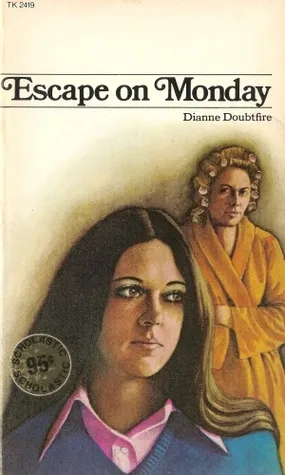
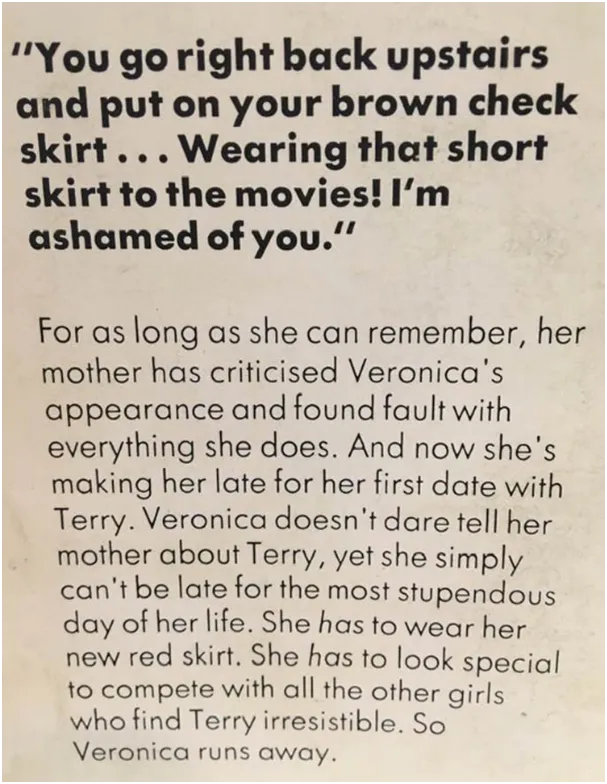
Why would I read this 1970 Sholastic paperback, the author's name soundling like an obvious alias, the book probably written in a week with very little revision? Pulp Fiction, cranke d out like factory sausages to feed a market of adolescent girls...?
Because my sister as a high school freshman ordered the book via the school. Oh, she ordered a lot of paperbacks like this one. Wrote her name inside,
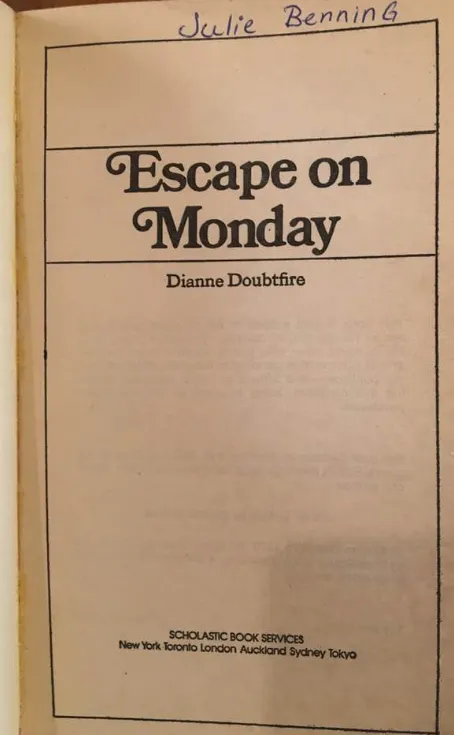
She devoured paperbacks, formed her mind with pulp fiction, and so when SHE wrote fiction, at age 15, it was clearly inspired by these uninspiring authors. Alas, my dear sister, I also read some of these books, which included afew Harlequin romances, some so old they cost fifteen cents each, and my own "Muse" was also stunted by having been formed and "informed" and shaped by lame novels like this one.
It has its merits. One, it is mercifully short. Fast-paced. Too shallow, too lacking in character development and depth, to slow down the reader the way, oh, say, Dostoevsky or Henry James might. Then again, I spent a few excruciating years in a 21st Century fiction writing workshop, and maybe 50 years from now readers will look back at today's prose with all the disdain that these workshoppers showed to all who had grown up reading and writing like this:
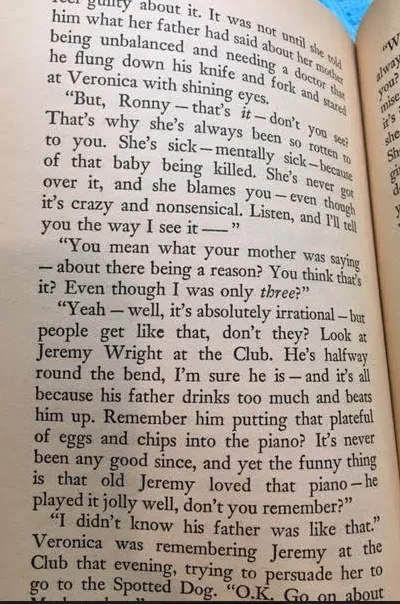
Ok, there were worse examples, but this one uses exclamation points, italics, big hyphens, and Big Revelations that emerge via telling (via dialogue!) vs "showing."
Before I say another word, either in defense of or in derision of this paperback, I want to say it explains a lot. Even bestsellers of the era were pretty awful by contemporary standards. And Jane Austen is a head-hopping, POV-violating, telling vs showing, sappy romantic, but guess who still reads Jane Austen. (Guilty!)
In her formative years in high school, what my sister read influenced the kind of fiction she wrote. Oh, she showed great promise as a writer. Sadly, she had read and internalized some of the worst habits of last-century writers. Superficial, poorly developed, contrived, lame-ass plots and characters doing and saying stupid things. Yeah. That about sums it up. Lest you doubt that reading trashy paperbacks can stunt, damage, even cripple our Muse, let me point out that the author of this particular novel wrote several How To Write books. Lord have mercy!
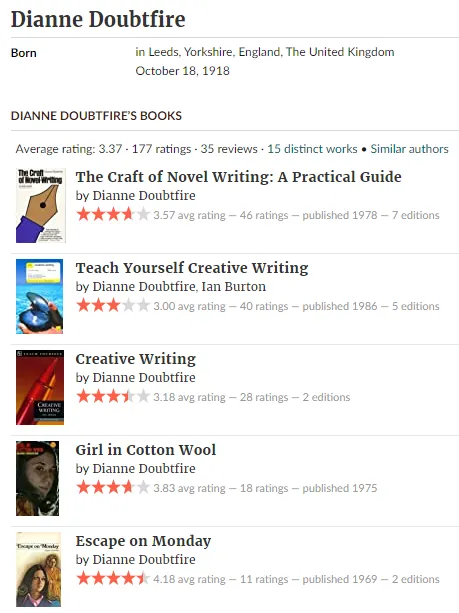
"Escape on Monday" opens with a sixteen-year-old in a very expensive red mini-skirt, but she earned the money for it as a full-time hairdresser, because apparently in the UK, pre-1970, this was not unusual. Did she finish high school at 16, or not earn a diploma at all? We don't know, and we don't need to know. She's off to meet a long-haired musician, age 19, against her mother's orders.
The mother/daughter arguments are typical, and Veronica sasses back like a typical teenager. She doesn't win any sympathy from me, but I am now a grandma, not the intended audience for this book. Veronica lies to her mom about her whereabouts, but she'd never be allowed to leave the house if she told the truth, and her true whereabouts were harmless: youth clubs filled with her peers, drinking soda, not shooting drugs, listening to music, not watching porn. Even so, Veronica's church-going mom won't let her daughter have a normal social life. Mom is a relic of the Dark Ages.
Then again, Veronica is quite liberal in that way of so many 1960s-70s teens who had their own ideas of what's appropriate. From her thoughts on marriage as "just a piece of paper," I figured she was going to be in real trouble by the end of the novel. Spoiler: no, she does not get seduced and "deflowered."
I wish I could remember my own sister commenting on this book, but she didn't share her thoughts with me. I do remember Julie at 17 in her short-shorts, her plunging necklines, her six-inch heels, her big earrings and blue eye shadow, yelling back at my father that she WILL dress like Cher if she so chooses, never mind that Cher was six feet tall and hardly more than a hundred pounds, while Julie was short and well-endowed. As a mother, I wouldn't have wanted my teenage daughter leaving the house dressed like that. Never say a girl is "asking for it" the way she dresses, but for heaven's sake, a little modesty should never be so out-of-style that a girl feels out of place among her peers if she is not showing off acres of bare skin. Ok, so, teen readers will love this novel, but from the first page, I was no fan of the heroine myself.
The heroine's mother, however, is a real piece of work. Her judgments are so awful, her tone, her word choices, all over-the-top evil. Her punishments are medieval. Why can't her husband stand up to her and protect his only child from this ugly, evil, so-called mother? Veronica's father is a classic enabler who lets the awful mother verbally abuse their daughter, and him, belittling him for not providing her with a nicer home and a bigger income, demeaning his hobby of crafting beautiful little model ships.
Of course this Public Embarrassment of a Mother has a reason for being petty and vindictive, and when the big climax comes, we are supposed to rejoice that the long-haired boyfriend rescues the awful woman from - well, no spoiler here.
Speaking of the boyfriend: after barely getting to know Veronica, he's in love, talking marriage, and she at age 16 is more than ready to tie the knot.
By 1970, hadn't women in the UK come a long way, baby?
The dialogue was awful, the plot superficial and contrived, the characters lacking in depth and development.
I should give this one star, but the trip down memory lane was kinda fun.
I had planned to tackle the writing itself,
the lame, dime-a-dozen quality of plot and prose, all things that entered MY own writing, and my sister's.... but .... Julie did not live long enough to hone her skills as a novelist. She who read so many mysteries and whodunnits became a Cold Case, and unlike books and movies, her murder has not been solved. I have blogged about Julie more times than I care to dredge up now with links.
I won't go on about Dianne Doubtfire (born in 1918? That explains a lot!) and her little paperback.
People bought her books.
My sister, for one.
And touching this yellowed paperback today, turning pages Julie had turned, took me back to a time and place I had buried deep in the basement of my memories.
Thank you for reading!
"Keangaroo,"
because Kean sounds like Kane (not keen, hint, hint) 
Find me at Twitter: @tea_in_carolina novelist, reviewer, editor, book critic fan of indie authors & underdogs Follow My Reviews at Goodreads, NetGalley, Amazon Vine Rants, Raves, Reviews, History, Current Events My Wordpress Blog Perihelion Science Fiction Let's Fry Chicken Little nominated for 2015 Pushcart Award